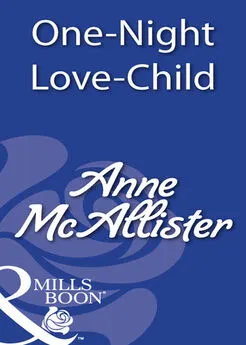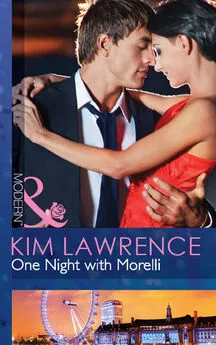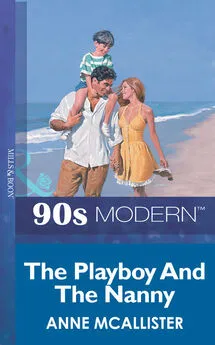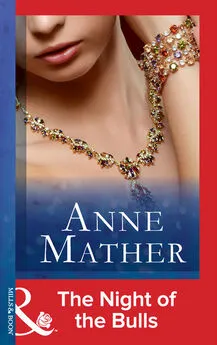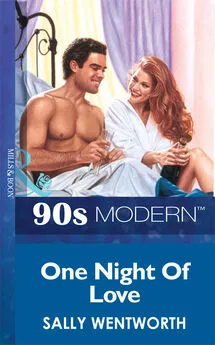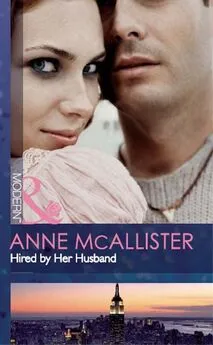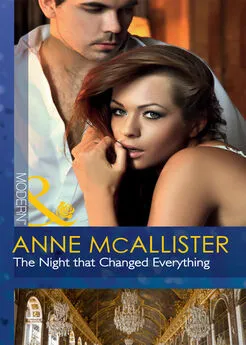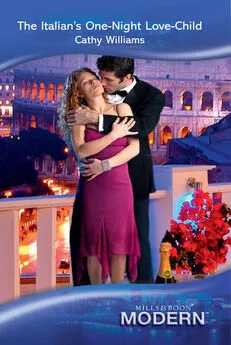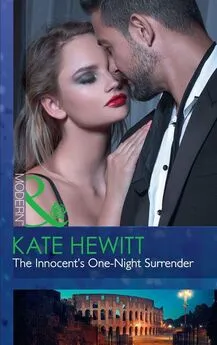Anne McAllister - One-Night Love-Child
- Название:One-Night Love-Child
- Автор:
- Жанр:
- Издательство:неизвестно
- Год:неизвестен
- ISBN:нет данных
- Рейтинг:
- Избранное:Добавить в избранное
-
Отзывы:
-
Ваша оценка:
Anne McAllister - One-Night Love-Child краткое содержание
One-Night Love-Child - читать онлайн бесплатно ознакомительный отрывок
Интервал:
Закладка:
Anne McAllister
ONE-NIGHT LOVE CHILD
 TORONTO • NEW YORK • LONDON AMSTERDAM • PARIS • SYDNEY • HAMBURG STOCKHOLM • ATHENS • TOKYO • MILAN • MADRID PRAGUE • WARSAW • BUDAPEST • AUCKLAND
TORONTO • NEW YORK • LONDON AMSTERDAM • PARIS • SYDNEY • HAMBURG STOCKHOLM • ATHENS • TOKYO • MILAN • MADRID PRAGUE • WARSAW • BUDAPEST • AUCKLAND
For Anne Gracie who kept my head above water
For Nancy, Cathy and Steve
who shared the journey
And for Kimberley Young, whose editorial
comments made this a better book
CONTENTS
CHAPTER ONE
CHAPTER TWO
CHAPTER THREE
CHAPTER FOUR
CHAPTER FIVE
CHAPTER SIX
CHAPTER SEVEN
CHAPTER EIGHT
CHAPTER NINE
CHAPTER TEN
CHAPTER ONE
THE letter arrived out of the blue.
“I don’t know what it is, my lord.” Mrs. Upham sniffed, then dangled the smudged and tattered pale-blue envelope from between two fingers with clear disapproval. “It’s very…dirty.”
She had put the rest of the post on Flynn’s desk in neat sorted stacks as she always did. Estate business—the biggest stack. Fan mail and book business—the midsize stack. Personal letters from his mother or brother—neither of whom seemed to believe in phones or e-mail—in the third.
All very tidy and organized—as if she could do the same to Flynn’s life.
Good luck, he thought.
As his life currently consisted of Dunmorey, a dank and crumbling five-hundred-odd-year-old castle full of portraits of disapproving ancestors who looked down their noses at Flynn’s efforts to literally keep a roof over their heads, its attendant farms, lands and tenants, as well as his horse-mad brother, Dev, who had great plans for reviving the Dunmorey stud but no money to accomplish it, and his mother, whose mantra since his father’s death seven months ago had been, “We need to find you a bride,” Flynn didn’t think Mrs. Upham was likely to find any joy in it at all.
The only joy he could give her would be to tell her to throw it out.
His father certainly would have.
The late eighth earl of Dunmorey had no patience for anything that wasn’t proper and traditional. He had once thrown out a letter Flynn had scrawled on a piece of a paper bag from a war zone where he’d been working on a story.
“If you can’t be bothered to write a proper letter, I can’t be bothered to read it,” his father had informed him later.
It would have been nice if the late earl had stopped saying things like that since he was dead. But the fact was, Flynn spent most days trying to deal with all of Dunmorey’s demands while inside his head he heard the virtually unceasing drone of the dead eighth earl saying, “I knew you couldn’t do it.”
Save the castle, he meant. Be a good earl, he meant. Be dutiful and responsible and Measure Up, he meant.
If you can.
The implication had always been that Flynn couldn’t.
“My lord?” Mrs. Upham persisted.
His jaw tight, Flynn glanced up. He needed to run these figures again, to see if somehow—this time—there was enough to put the new roof on and still get the stables in order by the time Dev brought his new stallion home from Dubai.
There wouldn’t be.
He had more chance of hitting the New York Times bestseller list with his new book coming out in the States next month. At least he had a talent for hard-hitting interviews, for insightful stories, for the written word.
It was what he’d done—what he’d been good at—before the earldom had changed his life.
But he was not going to give up on Dunmorey, even though the battle to keep the grim old Irish castle from crumbling to bits under his watch was fierce. It was his obligation, not his joy. And frankly, as a younger son, he had never expected to have to do it.
But like everything else in his life these days, he’d inherited while he was making other plans.
His late father would have said it served him right.
And maybe it did.
It wasn’t what he would have chosen, but by God, he was determined to show the old man—dead though he was—that he could do it right.
“Everything you need to deal with is here, my lord,” Mrs. Upham said. “I’ll just throw this nasty old thing out, then, shall I?”
Flynn grunted and started again at the top of the column.
“May I bring you a cup of tea, my lord? Your father always liked a cup of tea with his post.”
Flynn ground his teeth. “No, thank you, Mrs. Upham. I’m fine on my own.”
He had learned rather quickly that while in Mrs. Upham’s eyes, he would never be his father—and thank God for that, Flynn thought—he did have his own version of the Voice of Authority.
Whenever he used it, Mrs. Upham got the point.
“Very good, my lord.” She nodded and backed out of the room. He might as well have been the king of England.
He did the figures again. But they still didn’t give him the total he wanted. He sighed and slumped back in his chair, rubbed his eyes and flexed his shoulders. He had an appointment with a contractor at the stables in an hour to see what else needed to be done before Dev brought the stallion home in a fortnight.
As the horse was a proven winner and thus a money-making proposition, the stables were an absolute priority. Stud fees and book royalties didn’t seem like enough to keep Dunmorey afloat.
The castle had been in the family for more than three hundred years. It had seen better times, and, hard though it was to believe, it had seen worse times as well. To Flynn it was the physical embodiment of the family motto: Eireoidh Linn, which he knew from his Irish schooldays meant, roughly, We Will Succeed Despite Adversity.
His father had always told English-speaking guests it meant, We Will Survive!
So far they had; though since the castle was no longer entailed, it could be sold.
They hadn’t had to sell it yet. And Flynn was damned if he was going to be the one to lose the fight.
But the post brought more renovation estimates that were depressingly large, and bills that were equally so. They’d borrowed against the castle to get the money to get the stud up and running. When it was, things would be better. If his book did well, they would certainly improve. In the meantime…
Flynn shoved back his chair and got up to prowl the room, cracking his knuckles. It was on his return to the desk that his eyes were drawn to the spot of blue paper in the bottom of the bin.
It was every bit as dirty and crumpled and unappetizing as Mrs. Upham had said. And yet it intrigued him.
It wasn’t another bill or another set of estimates. It wasn’t a circular about a farm auction or an invitation to Lord and Lady So-and-So’s house party. It wasn’t stuffy. It wasn’t embossed.
And it was, he could see, addressed half a dozen times over, to him. A call from his old life.
“Junk,” his father would have said, dismissing it.
But he had never been his father, as they all well knew.
Flynn reached down and fished it out. The original address had been sent to him in care of Incite magazine in New York City.
His brows lifted at that. Once upon a time he’d done entertainment personality pieces and feature articles for them. But he hadn’t written articles for Incite in years. Not since he’d covered what had been dubbed “The Great Montana Cowboy Auction” in tiny Elmer, Montana, six years before.
His father had always called those articles “fluff” and said it was a pity Flynn hadn’t been good enough to write real news about something that mattered.
In fact, he had been. And the succession of addresses crossed out on the envelope were pretty much a record of where he had proved exactly that: Africa, the East Indies, west central Asia, South America, the Middle East.
One hot spot after another, each one hotter than the last.
Now he stared at the envelope, caught up in a flickering cascade of memories—of excitement, of challenge, of life.
He studied again the firm but neat feminine handwriting beneath the others. He didn’t recognize it. He was amazed that the letter had caught up with him at all. It must have been a labor of love or sheer stubborn perseverance on the part of the world’s post offices. The single U.S. domestic postage stamp had first been canceled in November five years before.
Five years?
Five years ago last November Flynn had been in the middle of a South American jungle, writing a “real news story” on twenty-first-century intertribal warfare—by experiencing it firsthand.
“You sure you want to do this?” His editor in London had been skeptical when Flynn had announced he was going. “You’ve already been shot once this year. This time you could get yourself killed.”
That had been the general idea at the time.
His older brother, Will—“the heir,” his father had always called him—had died just months before. And depending how you looked at it—certainly if you looked at it the way the earl did—Will’s death had been Flynn’s fault.
“He was going to the airport to meet you!” the earl had railed, feeling only his own pain, never even acknowledging Flynn’s. “You’re the one who had to come home to recover! You’re the one who got shot!”
But not the one who’d died.
That had been Will—steady, sensible, responsible Will who had stopped on the way to the airport to help a motorist change a flat tire and got hit by a passing car.
In a matter of an instant, the world changed—Will was gone and Flynn had become “the heir” in his place.
It was hard to say who was more dismayed—Flynn or his father.
Certainly when he’d recovered from his gunshot wound received pursuing one of those “real news stories that mattered”—the one he’d come home to recuperate from when Will had been killed—no one, least of all his father, had objected when he’d left for the intertribal warfare in South America.
No one had objected when he’d pursued increasingly dangerous assignments after that.
But no matter how dangerous they were, no matter that he got shot again, more than once, Flynn hadn’t died. He’d still been the heir when his father had dropped over from a heart attack last July.
Now he was the earl. He wasn’t traveling the world anymore. He was stuck at Dunmorey Castle.
And a five-year-old letter that had chased him around the world and finally tracked him down seemed far less demanding—and much more appealing—than thinking about any of that.
Flynn slit it open. Inside was a single sheet of plain white paper. He took it out and unfolded it. The letter was brief.
Flynn. This is the third letter I’ve written you. Don’t worry, I won’t be writing any more. I don’t expect anything from you. I want nothing. I just thought you had a right to know.
The baby was born this morning just after eight. He was seven pounds eleven ounces. Strong and healthy. I’m naming him after my father. Of course I’m keeping him. Sara.
Flynn stared at the words, tried to understand them, put them in a context where they would make sense.
Expect…nothing…right to know…baby.
Sara.
The paper trembled in his fingers. His heart kicked over in his chest. He started again—this time with the signature: Sara.
An image of intense brown eyes, flawless ivory skin and short-cropped dark hair flickered through his mind. A vision of smooth golden skin and the taste of lips that spoke of cinnamon and spice teased his thoughts.
Читать дальшеИнтервал:
Закладка:
